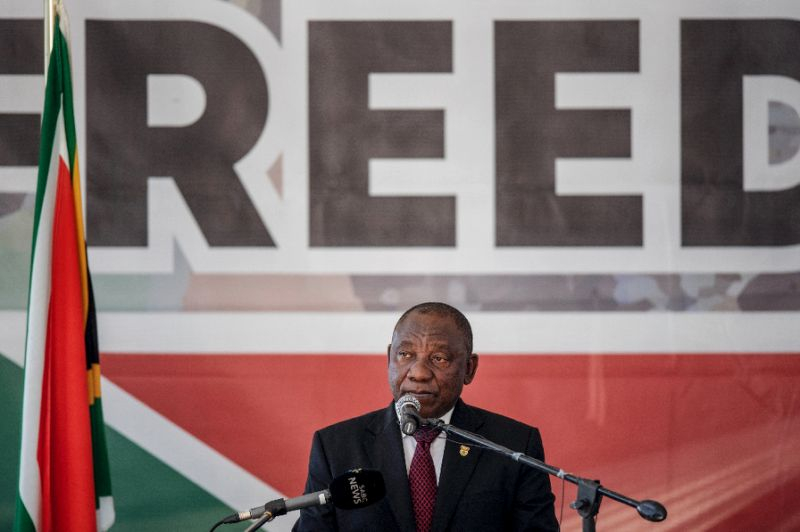
Africa
11:21, 08-May-2019
South Africa 2019 election: A referendum on Ramaphosa
By Le Tian

After months of campaigning, nearly 27 million eligible voters are heading to the polls on Wednesday, which also marks South Africa's sixth national election since the end of apartheid rule in the country 25 years ago.
In 1994, Nelson Mandela led the African National Congress (ANC) to power in the country's first multiracial ballot. Since then, the ANC has won every parliamentary election.
Public opinion polls suggested that the party will certainly win another majority on Wednesday and its leader Cyril Ramaphosa will, therefore, continue as president, making the election more like a referendum to the president and its party.

South African President Cyril Ramaphosa delivers the keynote address at the Freedom Day national commemoration event in Makhanda, Eastern Cape, South Africa, April 27, 2019. /AFP Photo
South African President Cyril Ramaphosa delivers the keynote address at the Freedom Day national commemoration event in Makhanda, Eastern Cape, South Africa, April 27, 2019. /AFP Photo
Addressing a ceremony for National Freedom Day on April 27, Ramaphosa said, "As we celebrate 25 years of democracy, we need to focus all our attention and efforts on ensuring that all South Africans can equally experience the economic and social benefits of freedom."
The 66-year-old president, former labor leader and millionaire, who was elected as ANC leader in December 2017 by a razor-thin margin before replacing Jacob Zuma as president in February last year, has a long way to go before reaching his vision of South Africa.
Read more:
How does the election work?
The general election is held to elect a new National Assembly and provincial legislatures.
A record high number of 48 parties will contest the national vote this year while only 29 political parties contested in 2014.
Those 400 seats in the National Assembly and the legislatures of nine provinces (size varies depending on population) are both allocated according to the percentage of votes parties win.

Voters do not directly choose representatives or the president. Parties have already submitted a list of members to take up the seats in the national and provincial legislatures.
Candidates for president will be nominated from among the members of the National Assembly so the president is effectively the leader of the majority party.
Why does the election matter?
Ivor Sarakinsky, professor of Wits University told CGTN, the election on the one hand is a test of whether President Ramaphosa is able to "restructure, reform the ANC and make the ANC electable in terms of resolving all the controversies of his predecessors."
On the other hand, Sarakinsky believed the election will see the extent of the decline in support of the ANC. The party has become increasingly unpopular due to corruption scandals and failure to improve the living conditions of the people.
00:56

ANC's popular support has fallen since 2004. For instance, the party won just 54 percent in 2016 local elections, a sharp drop from 62 percent in 2014 national election.
"We know the numbers will go down," Sarakinsky noted and added, "It's a question of how much they go down."
Surveys by polling firms and research institutes estimated the ANC's support rate could range from 51 percent to 61 percent.
Sarakinsky analyzed if the ANC is polling below 55, it would be difficult for Ramaphosa and his government to purse some items on his agenda more effectively.
What are the critical issues?
Although the country is plagued by many problems, Professor Sarakinsky pointed out that the priorities of South Africans are to improve the quality of life.
He believes that the most pressing issues concern the economy, employment, healthcare, transport, education, and the provision of basic services like electricity and clean and potable water.
The country's economic growth in the past decade slowed to below 2 percent (last year's growth was lower than one percent) which is the lowest among emerging markets, with approximately half of the adult population living below the poverty line and worst income inequality globally.
01:19

Meanwhile, the unemployment rate reached 27 percent in the fourth quarter last year and South Africa's youth jobless rate is also the highest in the world.
Land reform is another popular issue as many South Africans don't have houses and are unable to enjoy adequate electricity and sanitation.
Meanwhile, some have also blamed corruption for the dismal public services. Former president Jacob Zuma, and even some of the candidates on the party's list, are still under investigations of corruption, even though they have all denied wrongdoing.
What are Ramaphosa's challenges?
Ramaphosa's reform initiative "is going to be the test of his power base inside the ANC, and his popular support outside the ANC, to carry through that mandate," said Professor Sarakinsky.
Struggling to rebuild the ANC's reputation, Ramaphosa repeatedly promised to restructure the country, including reforming the way the public service works, state-owned enterprises work, and public institutions work.
01:43

However, these promises, according to Sarakinsky, could lead to political conflicts, since the old factions inside the ANC "have an invested interest in keeping things the same and obstructing the reform. If the reform succeeds, they have a fair chance of ending up in jail."
Ramaphosa needs to "reconcile those reform initiatives with stakeholders who have vested interest in the old order – in terms of organized labor, in terms of organized business, who have a stake in things remaining the same," the professor noted.

SITEMAP
Copyright © 2018 CGTN. Beijing ICP prepared NO.16065310-3
Copyright © 2018 CGTN. Beijing ICP prepared NO.16065310-3